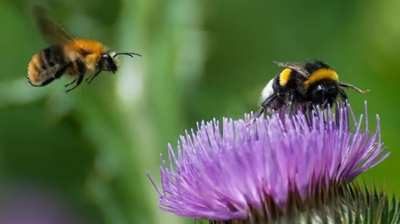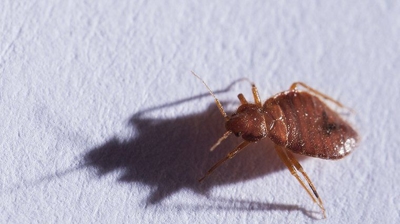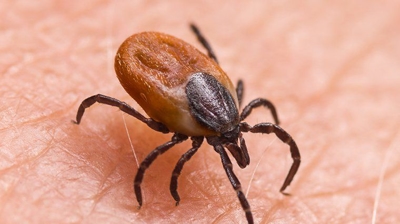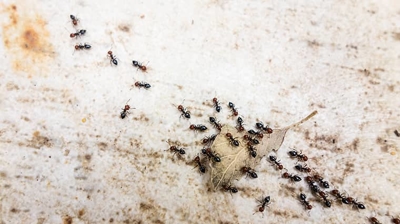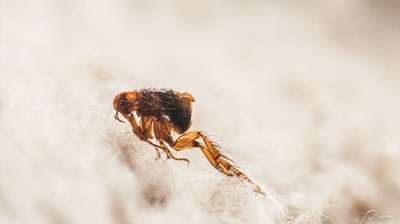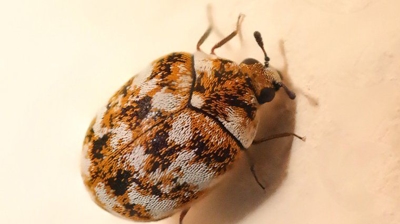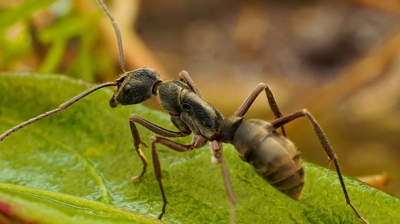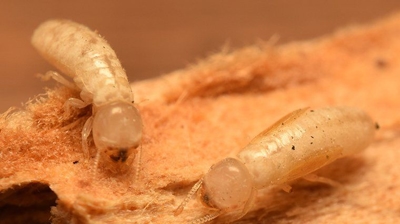
Ants In The House: Understanding the Risks And Health Concerns In Lawrenceville
One of the mainstays in our refrigerators is milk. Can you imagine how cereal would taste without milk? The reason this product has a long shelf-like is due to the work of French chemist Louis Pasteur. While famous for developing the pasteurization of milk, Pasteur proved the existence of germs. Why is that important? Because for millennia, many could not conceive how practically invisible organisms could invade the body and cause disease. Pasteur's work was revolutionary for the world of medicine.
We often discount tiny things as unimportant due to their size. Take ants, for example. These little creatures roam about in our yards and contribute to the ecosystem, but we don't think about them, at least not until they invade our homes. When we see them marching along in a line along the baseboard, we know we want to get rid of ants, but only because we see them as a nuisance; however, ants are more than a nuisance.
If ants have moved into your home, you need pest control in Lawrenceville from ProCare Pest Services. Our commitment to our customers and the local community has enabled our family-owned business to expand to two locations taking care of thousands of customers in less than a decade. When you partner with us to remove ants from your home, you will quickly discover why the best care is ProCare.
Continual education of our technicians and community is part of our commitment to providing excellent service. Please continue to read this article as we unpack information that will guide you as you seek to end the ant problem in your house.
Ant Communication: How Infestations Develop And Spread
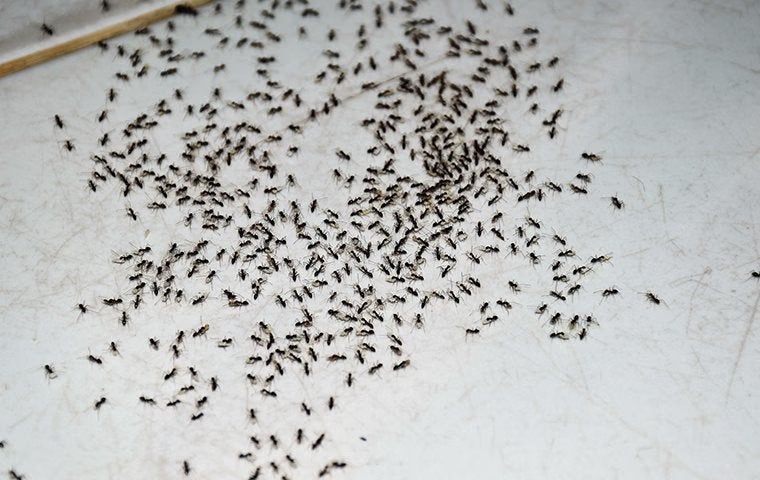
Before examining how ant infestations begin, let's go inside a typical ant colony. Ants are social insects that live in groups in the soil or wood outside the house. In those nests are a queen (s), worker ants, and reproductive ants; reproductive ants may or may not have wings, depending on the species.
Winged male and female reproductive ants are known as swarmers or alates. When the warm air currents of spring arrive, swarmers leave the nest and search for mates and locations. During their flight, the ants search for flying ants from other colonies to mate.
The males fertilize the females and soon fall to the ground and die. The fertilized females continue until they find a suitable future location in the soil or wood (carpenter ants). Upon landing, the female ants discard their wings and create a burrow to deposit the eggs. Sterile worker ants are the first batch of offspring, and when they mature, they expand the nest by creating tunnels and chambers. Worker ants also forage for food for the queen and additional offspring. Once the nest has grown significantly, the queen produces swarmers, and the cycle restarts in a different location.
Some types of ants do not produce winged reproductive ants. In these cases, the male ants (drones) fertilize the females and soon die. When the colony experiences a threat, the fertilized females and an army of sterile workers ants flee the group to begin a satellite colony nearby. This method is called "budding." Ant species that create colonies through budding develop satellites quicker than those that swarm.
Where fertilized females go to begin a new nest depends upon the species. Carpenter ant females search out crevices in damp wood, fire ants prefer warmer dirt next to structures, and pavement ants like to reside in asphalt or masonry cracks. Most ants prefer moist areas with nearby organic plant or animal materials. Once the female lands or travels to a site, she creates a chamber to deposit her eggs. Queen ants that expand colonies through budding already have sterile workers to help forage and raise their young, but the swarmer queen who arrives by herself has to nurture the first batch of offspring by herself.
When worker ants find food sources, they secrete pheromones to guide other ants. If they enter a home and find accessible protein, fat, and carbohydrate sources, they create chemical trails that alert other ants and draw them into the house.
It is beneficial that ProCare Pest Services provides ant control in Lawrenceville because if you use the wrong treatment method, you can end up with a worse situation. For example, treating an infestation by swarming ants differs from one caused by budding ants. If you use the wrong product on budding ants, you will have more nests than when you began the elimination process. Our technicians will identify the ant species in your home to ensure we use the correct eradication techniques.

Why Choose ProCare Pest Services?
-
Locally Owned & Operated
-
Timely Services Available
-
Free Inspections for Your Home or Business
-
Modern & Effective Pest Control Methods
Ant Prevention Is Key: Effective Tips And Tricks
No one can prevent ants from swarming onto your property, but there are steps you can take that will discourage them from remaining on your land and entering your house.
These tips will deter ants from infesting your home in the future:
- Remove debris, junk, and overgrown vegetation around the house
- Provide drainage for gutters, low-lying areas, and ditches
- Prune shrubs and tree branches away from the structure
- Keep outdoor and indoor garbage containers closed
- Seal cracks in the foundation and roofline with caulk
- Repair the window and door screens
- Install door sweeps under exterior doors
- Vacuum the house regularly
- Suction out corners and crevices between the baseboards, flooring, and walls
- Repair leaking plumbing and water fixtures
Incorporating these ant prevention tips after our ProCare Pest Services technicians clear the current infestation will help deter a future ant invasion in your Lawrenceville home.
-
"Tech and he’s pretty awesome"
I have been using Pro care for about a year or more now and I have no complaints. They have a really good staff.
Kisha L. -
"They also make things convenient and easy"
Always love how friendly the techs are.
Ashlae P. -
"Extremely pleased with the company"
Professional! Communication was excellent. Arrived on time did a great job.
Tonja B. -
"John was very responsive and willing to answer any questions we had"
First meeting with Procare and staff.
Marty C.
Professional Ant Control: A Great Way To Keep Ants Out For Good
The best way to remove ants from your home is to use the ant pest control company near you, ProCare Pest Services. When a technician arrives at your location, we will inspect the interior and exterior for signs of an infestation, entry points, and attractants. Using the data we collect, we will present you with a strategic plan that targets the problematic ant species. Upon approval, we treat the home to end the infestation and create a barrier to prevent a future invasion.
Contact us today to learn about our residential and commercial pest control services in Lawrenceville and get a free estimate. The best care is ProCare.
Complete the form below to request your quote.

Stay In The Know
-
 Carpenter Bee Survival Guide: Identification, Control, And PreventionRead More
Carpenter Bee Survival Guide: Identification, Control, And PreventionRead More -
 Identifying A Bed Bug Infestation In LawrencevilleRead More
Identifying A Bed Bug Infestation In LawrencevilleRead More -
 Key Practices To Prevent Ticks On Your Lawrenceville PropertyRead More
Key Practices To Prevent Ticks On Your Lawrenceville PropertyRead More -
 A Helpful Pavement Ant Prevention Guide For Lawrenceville HomesRead More
A Helpful Pavement Ant Prevention Guide For Lawrenceville HomesRead More -
 Breaking the Flea Life Cycle In LawrencevilleRead More
Breaking the Flea Life Cycle In LawrencevilleRead More -
 Defeating Carpet Beetles And Reclaiming Your Lawrenceville HomeRead More
Defeating Carpet Beetles And Reclaiming Your Lawrenceville HomeRead More -
 Lawrenceville's Guide To Complete Ant RemovalRead More
Lawrenceville's Guide To Complete Ant RemovalRead More -
 Innovative Termite Control: Modern Solutions for Modern HomesRead More
Innovative Termite Control: Modern Solutions for Modern HomesRead More
